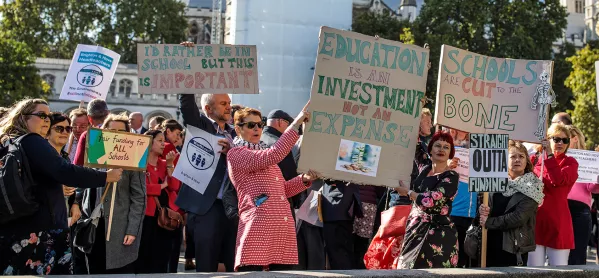Headteachers have voted to explore industrial action - which could include a strike - if the government fails to tackle the “crisis in school funding”.
The NAHT heads’ union said that a strike was an option available but it would look at a range of actions if there is no new money from the government for schools.
London headteacher Dave Woods told the union’s conference in Telford that it was a national scandal that the government of the fifth largest economy in the world was unwilling to invest in the future generations.
NAHT: Third of heads ‘thinking of quitting early’
School funding: Councillors join battle on funding
Background: DfE’s problems on school funding
Chris Knowles, a head from Scarborough, North Yorkshire, told the conference that he had already made every possible cutback at school, even replacing Blu Tack with a cheaper “blue slime”.
“I am ashamed of that fact that we are having to make redundancies at school,” he said.
Impact of the school funding crisis
“We have all got to stand up and fight for our colleagues and the children that they serve so well.”
Research by the NAHT last year indicated that 86 per cent of school leaders had cut teaching assistants, and more than a third (37 per cent) had cut teaching staff, while 65 per cent agreed that cutbacks had already had a negative impact on the performance of their school.
Delegates passed a motion calling on the union to explore options “up to and including industrial action” in response to the funding crisis.
The motion said this could include heads refusing to make any school staff redundant or refusing to reduce the terms and conditions of staff in order to balance the budget.
It also suggested that heads should set projected budgets for the coming year that reflect the actual cost of running a school.
An NAHT statement before the vote suggested that a strike could also be an option.
Proposing the motion, Mr Woods said: “This crisis with funding has reached a point whereby schools are no longer able to provide the standards of education afforded to previous generations in this country. This is not good enough.”
Paul Whiteman, the NAHT’s general secretary, said: “Whilst the government has now acknowledged that school budgets are at breaking point, there’s real frustration about how long it’s taking to deal with the funding crisis.
“Industrial action is a last resort for any union, and in particular in a professional environment where we’re looking after children and are so active in communities.
“But we can’t rule it out. This motion is just reaffirming our commitment to our campaign for more funding for schools and young people, which everyone agrees is urgently needed.”
The NAHT statement said: “Whilst our motion talks about industrial action, a strike is only one of the options available.
“We are voting on a proposal to consider a range of options available to us if there is no new money from the government for education.”
A Department for Education spokeswoman said: “We are clear that industrial action disrupts children’s education, inconveniences parents and damages the profession’s reputation in the eyes of the public.
“The core schools and high-needs budget is rising from almost £41 billion in 2017-18 to a record £43.5 billion by 2019-20 and we have introduced a wide range of support to help schools reduce costs and get the best value from their resources.
“As the education secretary said during his speech to the NAHT, he recognises the pressure schools feel on their budgets and as we approach the next spending review, he will back headteachers to have the resources they need to deliver a world-class education.”




